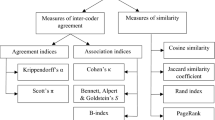Within the Bayesian approach to the training of multi-layer perceptrons for classification problems, the interpretation of the outputs as posterior probabilities of class-membership requires us to integrate out (marginalise) the network function over the distribution of network weights. MacKay [1] suggests an approximation of such an analytically intractable integral, in which the integration is over the network output preactivations. The network predictions can be over-optimistic if this process of marginalisation is ignored. This study attempts to assess the effect of marginalisation, with the approximation mentioned above, on two Bayesian neural network models: one with a single regularisation term; and another giving way to a process known as
Automatic Relevance Determination (ARD), with multiple regularisation terms. A real-world classification problem, concerning the discrimination of online purchasers and non-purchasers using Internet’s WWW users’ opinions, is the test-bed for this assessment.
Similar content being viewed by others
Author information
Authors and Affiliations
Rights and permissions
About this article
Cite this article
Vellido, A., Lisboa, P. An Electronic Commerce Application of the Bayesian Framework for MLPs: The Effect of Marginalisation and ARD . Neural Computing & Applications 10, 3–11 (2001). https://doi.org/10.1007/s005210170012
Issue Date:
DOI: https://doi.org/10.1007/s005210170012




